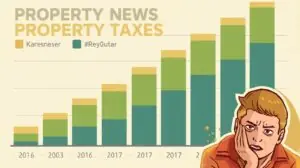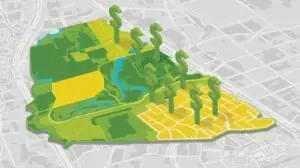Property owners across America face a frustrating reality: why vacant land property taxes keep increasing every year, even when the land sits unused. This trend affects millions of landowners who watch their tax bills climb while receiving no income from their property.
Understanding the reasons behind rising property taxes can help you make informed decisions about your vacant land. More importantly, knowing your options can save you thousands of dollars in the long run.
The Main Reasons Property Taxes Rise on Vacant Land
Local Government Budget Needs
Municipalities rely heavily on property taxes to fund essential services. Schools, police departments, fire services, and road maintenance all require consistent funding. When these costs increase, local governments often raise property tax rates to meet budget demands.
![]()
Vacant land contributes to this tax base without requiring many municipal services in return. This makes it an attractive target for tax increases when governments need additional revenue.
Property Value Assessments
Tax assessors regularly evaluate property values to ensure fair taxation. Even vacant land can appreciate due to nearby development, improved infrastructure, or changing zoning laws. When assessed values increase, property taxes follow suit.
![]()
Market conditions play a significant role in these assessments. Research shows that land value by zipcode varies dramatically based on local economic factors and development potential.
Infrastructure Development
New roads, utilities, and public facilities increase property values in surrounding areas. Your vacant land might gain value from infrastructure improvements you never requested or use. However, you still pay higher taxes based on this increased assessed value.

Development projects near your property can trigger significant tax increases. Airport expansions, highway improvements, and commercial developments all boost land values and corresponding tax obligations.
How Annual Tax Increases Impact Vacant Landowners

Cumulative Financial Burden
Small annual increases compound over time, creating substantial financial pressure. A property with $500 annual taxes can easily reach $800 or more within five years through regular increases.
Many landowners underestimate this cumulative effect when deciding whether to keep vacant land. The estimated value of land might not keep pace with rising tax obligations, creating a negative return on investment.
No Income Generation
Unlike rental properties or commercial real estate, vacant land typically generates no income to offset rising tax costs. This creates a pure expense that grows annually without providing financial benefits.
Some landowners hope for future development or sale profits to justify these carrying costs. However, why vacant land sits on the market for years often relates to overestimating future value while underestimating holding costs.
Factors That Accelerate Property Tax Increases
Economic Growth in Your Area
Regional economic development drives property values higher, leading to increased tax assessments. Job growth, population increases, and business expansion all contribute to rising property values and taxes.
Even distant economic development can affect your vacant land taxes. Improved transportation links or regional attractiveness can boost values across wide areas.
Zoning Changes
Local governments sometimes rezone areas for higher-value uses, instantly increasing assessed values and tax obligations. Agricultural land rezoned for residential or commercial use faces dramatic tax increases based on development potential rather than current use.

These changes can happen without landowner input or consent, creating unexpected financial burdens for property owners who planned for lower agricultural tax rates.
Municipal Financial Pressures
Local governments facing budget shortfalls often look to property taxes for additional revenue. Pension obligations, infrastructure maintenance, and public service costs create ongoing pressure for tax increases.
Vacant land owners become easy targets for these increases because the properties require minimal services while contributing significant tax revenue.
Strategies to Manage Rising Property Tax Costs
Appeal Your Assessment
Property owners can challenge assessed values they believe are too high. Successful appeals can reduce tax obligations, though the process requires time and documentation.

Gather comparable sales data and property condition information to support your appeal. Professional appraisals can strengthen your case but involve additional costs.
Explore Tax Relief Programs
Many jurisdictions offer property tax relief for specific situations. Agricultural use exemptions, conservation programs, and hardship provisions can reduce tax burdens for qualifying properties.
Research local programs that might apply to your vacant land. Requirements vary, but some programs offer significant savings for eligible property owners.
Consider Selling Your Vacant Land
The most direct solution to rising property taxes is selling your vacant land. This eliminates future tax obligations while converting your property into cash you can invest elsewhere.

Before selling, understand current market conditions and your property’s true value. Professional land buyers can provide quick cash offers without the uncertainty of traditional real estate sales.
Many landowners discover that selling land property provides immediate relief from tax burdens while generating capital for better investments.
Why Professional Land Buyers Offer Advantages
Working with experienced land buyers provides several benefits over traditional real estate sales. These professionals understand vacant land markets and can close transactions quickly without requiring property improvements or extensive marketing.

Professional buyers also handle complex paperwork and due diligence processes, saving landowners time and potential legal complications. This streamlined approach helps you avoid additional property tax payments during lengthy sales processes.
Making the Right Decision for Your Situation
Understanding why vacant land property taxes keep increasing every year helps you make informed decisions about your property. Whether you choose to keep, improve, or sell your land depends on your financial situation and long-term goals.
Consider all holding costs, including rising property taxes, when evaluating your vacant land investment. Sometimes the best financial decision involves selling now rather than continuing to pay increasing taxes on unused property.

Want to sell your land fast? Contact She Buys Land today.